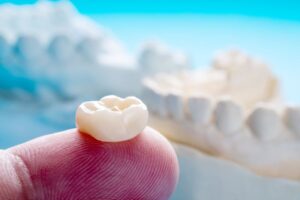
Dental crowns are highly durable. In fact, they can last for 10 – 15 years or longer with proper care! Still, there might come a time when a crown falls out. What should you do? Swift and proper action can help prevent complications and ensure that your smile remains healthy and confident. Here are some steps you should take if one of your restorations becomes loose or even falls out altogether:
Call Your Dentist
Call your emergency dentist as soon as possible to inform them of your situation. Tell them what happened, when the problem started, and other relevant details. Most dental practices prioritize patients with lost crowns and will try to see you promptly. In the meantime, they can provide practical and personalized tips to help you manage the situation.
Protect Your Tooth and Preserve Your Crown
If your dental crown falls off, you must protect the exposed tooth beneath it. Since it may be extra-sensitive and vulnerable to damage, you should avoid using it to chew. You should also not consume any highly acidic, hot, cold, sticky, or chewy items. Stick to a mild diet that will cause little to no oral irritation.
If you can locate your lost crown, carefully pick it up and gently rinse it with clean water to remove any debris. Examine both the crown and the exposed tooth. If there is significant damage to either, do not try to put the crown back in your mouth. Instead, place the crown in a clean, small container and bring it with you to your dental appointment. This allows your dentist to determine whether it is suitable for reattachment.
Attempt Temporary Reattachment
If the crown appears intact and your tooth is not broken or injured, you may try to temporarily reattach it. First, wash your hands thoroughly. Use a small amount of toothpaste or over-the-counter temporary dental cement to secure the crown onto your tooth. Gently place the crown back without using excessive force. Never use household adhesives, such as super glue, as these are unsafe for oral use.
After placing the crown back on your tooth, you should continue to avoid chewing on the affected side. Brush and floss gently around the tooth, taking care not to dislodge the crown again. Even if the crown feels stable, you should still see your dentist as soon as you can for a permanent solution.
Know What to Expect at the Dentist
At your dental appointment, your dentist will examine the tooth and the crown. If everything is in good condition, your dentist may recement the crown. If either the tooth or the crown has sustained damage, your dentist will explain your options. You may need restorative treatment or a new crown. It is best to consent to whatever plan they recommend so you can avoid additional damage to your smile and spare yourself from future discomfort.
Losing a dental crown can cause some anxiety! Thankfully, you can take practical steps to protect your oral health.
Meet the Practice
At Northborough Dental Associates, we are proud to provide a comprehensive range of services for our community, including high-quality dental crowns, same-day emergency care, and more. If you are concerned about the state of one of your restorations, we invite you to give us a call. Contact our office at 508-571-0358.
